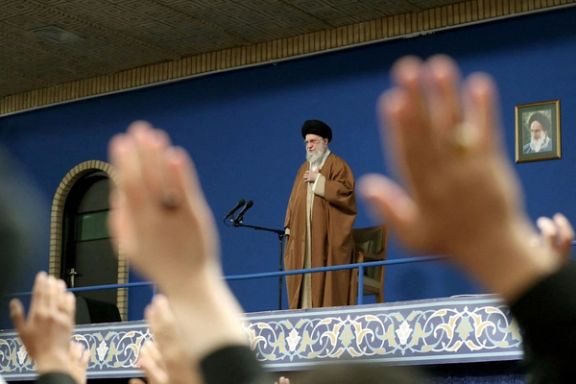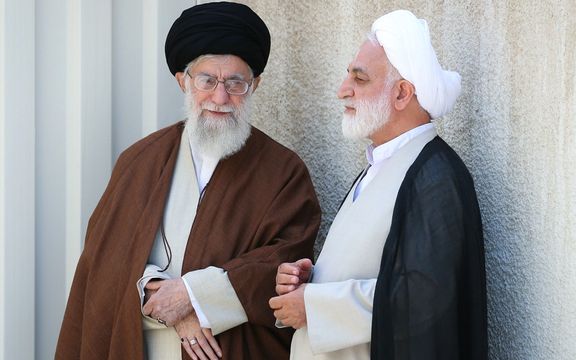Related Articles

To signal and justify possible nuclear concessions in ongoing US talks, Iran's Supreme Leader has once again alluded to a historic concession by a Shi'ite Muslim leader to buy time against a stronger foe.
The reference was the same deployed by the wily 86-year-old theocrat to justify Iran's agreement to a landmark 2015 nuclear deal.
Speaking Thursday at a modest religious gathering in his office on Thursday, Supreme Leader Ali Khamenei recalled how the second Shia Imam, Hasan ibn Ali—seen by Shia Muslims as a paragon of just leadership—signed a controversial peace treaty with hated foe Mu'awiya in 661 CE.
The treaty, Khamenei said, was a calculated move to safeguard the long-term interests of Islam.
Although he made no direct mention of the ongoing nuclear negotiations with the United States, the allusion is almost certainly a subtle endorsement of diplomacy.
“Some people would come forth with complaints and objections when Imam Hasan made peace with Mu’awiya … it is temporary. The Imam has been recorded as saying that this incident, this domination of heresy and hypocrisy, is not meant to be permanent,” Khamenei said.
Khamenei’s tone marks a shift from early February, when he dismissed engagement with US President Donald Trump as “unwise, undignified, and dishonorable" after Washington reimposed so-called maximum pressure sanctions.
While expressing wariness of the West, his stance has since shifted to cautious pragmatism. “We are neither overly optimistic nor overly pessimistic about these talks,” he said after the first round of talks earlier this month, before adding a sharp caveat: “I am very pessimistic about the other side.”
Khamenei used the same historical reference in 2013, branding Imam Hasan’s decision as an act of “heroic flexibility”—a phrase that became a byword for Iran’s nuclear diplomacy which helped seal the 2015 Joint Comprehensive Plan of Action (JCPOA).
“Khamenei resorts to tactical retreat whenever he finds himself in a difficult position,” US-based commentator Ali Afshari told Iran International TV.
“He is trying to warn and to provide a rationale (for his decisions) to his radical supporters. He is telling them they should not raise objections because acceptance of a deal is a tactical move rather than a strategic position.”
Hardline objections
The reference to Imam Hasan’s treaty follows a broader softening of rhetoric among clerics, politicians and media outlets after the first round of indirect US-Iran talks in Oman on April 12.
But Khamenei’s approval of diplomacy with the United States has exposed rifts among Iran’s hardliners. While some factions are rallying behind his position, some others—particularly ultra-hardliners who refer to themselves as the real revolutionaries—have expressed frustration.
In further comments on Thursday, the Supreme Leader appeared to confront those naysayers.
"Our neglect, at times our loose lips, our failure to help, our needless protests, lack of patience, (and) at times the flawed analyses that we make about the situation, can sometimes have an impact," he said. "One must be very careful."
With Khamenei’s authority remaining unchallengeable, dissent remains subdued and blame is often cast on others rather than Khamenei.
“The biggest reason (for Imam Hasan’s peace deal) was the lack of a loyal army," Sasan Daneshpajouh, an ultra-hardliner social media influencer with over 33 thousand followers posted on X.
"The Imam made a deal to save the Shi'ites from death and destruction, so that in the future they could form an army and ultimately win,” he added, implying Khamenei would not have been pushed into concessions had he possessed more loyal followers.

Long one of the Islamic Republic's staunchest ultra-conservatives, cleric and Chief Justice Gholam-Hossein Mohseni-Ejei has lately championed anti-corruption and urged caution on a new hijab law in a shift which has confounded allies.
But as Iran has reeled from the sudden death of a president, regional setbacks as well as deepening unrest and poverty, the rebranding by a conservative political fixture may be a calculated maneuver to survive in one of Tehran's most uncertain times.
In July 2021, Iran’s Supreme Leader Ali Khamenei appointed Mohseni-Ejei as Chief Justice following the election of another arch-reactionary cleric and former judge, Ebrahim Raisi, to the presidency.
But since taking office, he has gradually distanced himself from those of ultra-hardliners of the Paydari (Steadfastness) Party and other supporters of the former nuclear negotiator Saeed Jalili.
He has also cultivated a relatively cooperative relationship with the moderate administration of President Masoud Pezeshkian and supported some of its moves including the push for the temporary suspension of a new and very strict hijab law that could provoke public unrest if implemented.
Once infamous for his hardline stance and alleged human rights violations, Mohseni-Ejei has also attempted to rebrand himself as a champion of anti-corruption, repeatedly emphasizing the theme in public speeches.
The political repositioning has drawn sharp criticism from ultra-hardliners. In recent months, Mohseni-Ejei even publicly criticized the late President Raisi after his death over the handling of high-profile corruption cases, angering the Paydari Party and other staunch conservatives.
The backlash centered on the Debsh Tea corruption case, in which two of Raisi’s ministers were implicated and received what critics view as lenient punishments.
Hardliners have also condemned the judiciary’s handling of a long-standing and politically sensitive case involving alleged corruption in a failed gas export agreement with the UAE known as the Crescent deal, accusing the judiciary of neglecting to prosecute key reformist figures including former oil minister Bijan Zanganeh.
Rise to prominence
Born in 1956, Mohseni-Ejei studied at the Haqqani School in Qom, a seminary known for producing many of Iran’s leading hardline clerics. He holds the religious title of Ayatollah, signaling his status as a mujtahid—a scholar authorized to independently interpret Islamic law.
His public profile rose dramatically in 1998 during the televised corruption trial of Gholam-Hossein Karbaschi, the reformist mayor of Tehran. Acting as both judge and prosecutor, Mohseni-Ejei’s confrontational courtroom exchanges with Karbaschi were broadcast by state television, elevating his public profile.
Later that year, in November 1998, Khamenei appointed him as Prosecutor General of the Special Clerical Court, a powerful institution that operates independently of the judiciary and prosecutes only members of the clergy, often for politically charged offenses.
Around the same time, Mohseni-Ejei also represented the judiciary on the Press Supervisory Board, which played a central role in the mass closure of reformist newspapers in April 2000, just one day after a sermon by Khamenei attacking the free press.
The crackdown led to the arrest of numerous journalists and the shuttering of dozens of publications, and one of the most colorful alleged episodes in the jurist's career.
Prominent journalist Isa Saharkhiz accused Mohseni-Ejei of going berserk at a 2004 meeting of the Press Supervisor Board and said the cleric threw a two bowls full of sugar cubes at him and went on the attack, biting him in the shoulder.
Saharkhiz filed a lawsuit, but the case was never investigated or brought to court.
Mohseni-Ejei's career soared nonetheless.
Intelligence minister
In August 2005, Mohseni-Ejei joined President Mahmoud Ahmadinejad’s cabinet as Minister of Intelligence. He held the post until July 2009, when he was dismissed in the aftermath of the unrest following Ahmadinejad’s disputed re-election.
Following a brief transitional period during which Ahmadinejad temporarily assumed control of the ministry, Heydar Moslehi was appointed as Mohseni-Ejei’s successor.
Sanctioned chief justice
In August 2009, shortly after leaving the cabinet, Mohseni-Ejei was appointed Prosecutor General of Iran by then-Chief Justice Sadeq Amoli-Larijani. He was later promoted to First Deputy to the Chief Justice in 2014, a position he held until his elevation to Chief Justice in 2021.
In 2011, both the United States Department of State and the European Union sanctioned Mohseni-Ejei for his role in the deadly suppression of protests following the disputed 2009 elections, citing serious human rights abuses.
"I don't think (the talks) are going to fail, and that is because neither side has a better means of achieving its fundamental objectives," Sir Richard John Dalton, British Ambassador to Iran from 2002 to 2006, told the BBC in an interview on Wednesday.
"For the international community and the United States, that's a high level of assurance that Iran will stick to its commitments and never militarize its nuclear program, and for Iran that it gets some of its internationally linked economy back."
"Another reason for optimism is that President Trump's language has been consistent despite the threats which he should dial down," Dalton continued. "It's been consistent in expressing preference for sorting matters out through dialogue."
Dalton added that a statement by the foreign ministry of Oman, the country mediating the talks, following the latest US-Iran meeting on Saturday pointed to a framework for a successful deal.
"It included 'fair'. That means win-win, something for both sides. 'Enduring': this is vitally important because of the absence of any trust in Tehran that the United States is capable of sticking to agreements that it signs."
"'Binding': again endorsed by the international community, may be something which puts constraints on both sides that go beyond the actual words of the agreement. Then, 'Iran free of nuclear weapons' ... but Iran having its right to 'peaceful nuclear energy' that was in the Omani statement too, together with Iran being free of sanctions."
"Now this is the big win potentially for Iran, because its economy has been in tatters for many years, and the most significant threat to the survival of the regime is instability caused by potential breakdown of the economy," he said.
The Trump administration risks falling into a familiar pattern of concessions and extended negotiations with Iran over its nuclear program, potentially repeating the missteps of the Obama and Biden administrations, according to an opinion piece published by Dispatch.
Despite President Trump's tough rhetoric and military threats, his Iran strategy risks repeating past administrations' mistakes of softening demands, wrote Jonathan Ruhe, foreign policy director at the Jewish Institute for National Security of America.
Drawing parallels to the Obama era, Ruhe said that initial strong demands for Iran to dismantle its nuclear program and to accept intrusive inspections eventually gave way during the negotiations that led to the 2015 Joint Comprehensive Plan of Action (JCPOA).
The author added that Iran is exploiting the US willingness to prioritize diplomacy, using it as leverage to extract concessions and undermine American military threats.
Ruhe argues that the Trump team appears to be falling into the same trap, with Iran employing familiar tactics of seeking drawn-out indirect talks and interim arrangements while insisting on US guarantees and rejecting demands that contravene Khamenei's red lines.
Iran's renewed engagement in nuclear talks with the United States is likely a survival tactic driven by economic, geopolitical, and social pressures, rather than a fundamental shift in strategy, according to an analysis by Oded Ailam of the Jerusalem Center for Security and Foreign Affairs (JCFA).
Ailam, a former head of the Counterterrorism Division in the Mossad, pointed out the critical expiration of key provisions of the 2015 nuclear agreement in October 2025.
These "Sunset Clauses" include the end of restrictions on Iran's ballistic missile program, the ban on advanced uranium enrichment technology development, and limits on civilian nuclear trade.
The analysis warns that if these clauses expire without a new arrangement, Iran will face no significant legal barriers to developing a military nuclear infrastructure within weeks. This scenario, Ailam argues, could trigger a dangerous nuclear arms race in the Middle East, prompting countries like Saudi Arabia, the UAE, Turkey, and Egypt to pursue their own independent nuclear programs.
Drawing a parallel to a Persian proverb about muddying waters to catch fish, Ailam suggests Iran's negotiation method involves exhausting and obscuring, rather than seeking quick agreement.
